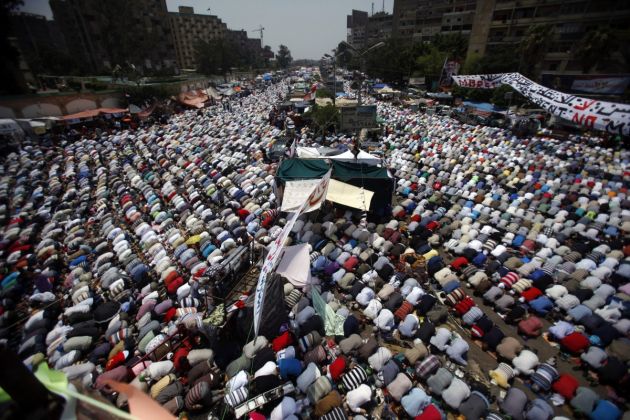Egyptian Christians face upsurge in attacks after coup

In apparent payback for the support given by the Egyptian Coptic leader for the ousting of Islamist president Mohammed Morsi, Egypt's Christians are facing an upsurge in violent attacks from extremists.
At least six of the country's 27 provinces have reported reprisals against Christians since Morsi was removed from office by the Egyptian military on July 3, according to U.S.-based ABC News.
Egyptian Coptic Pope Tawadros II publicly supported the military's action.
He also had criticized Morsi while in office and encouraged the once politically dormant Copts, who compose about 10 percent of Egypt's predominantly Muslim population, to become active in the face of persecution from Islamists.
Tawadros had also backed the roadmap for reform endorsed by other political leaders since the head of the Muslim Brotherhood was ousted.
"The Christians have emerged from under the robes of the clergy and will never go back," Ezzat Ibrahim, an activist from Minya, a southern province with a large Christian community, was quoted as saying in the ABC report.
The worst violence to date has been in the southern village of Nagaa Hassan, near Luxor.
When Islamists there discovered the body of a dead Muslim man, they went on a rampage.
Last Friday they killed Coptic Christian Emil Naseem Saroufeem, 42, a leader of the Tamard or "Rebel" movement in the area, Morning Star News reported.
The Rebel movement had gathered in cities in Egypt beginning on June 30 to demonstrate against Morsi.
For unknown reasons, the Islamists blamed Saroufeem for the death of the Muslim man.
Three others were killed as they attempted to hide Saroufeem from the mob. In addition, other Coptic villagers were beaten and their homes looted and burned.
Morning Star reported that a total of 20 homes were destroyed in Nagaa Hassan
The situation is calm there now, according to Safwat Samaan, a director at human rights group Nation Without Limits. He told Morning Star that there are 95 Christian families that are at the church of Mar Youhana because they are too scared to go back.
"Also, a lot of these people had their homes burned down, and if not that, a lot of them had their houses torn apart and looted," he said. "The church is trying to get them to return home, but a lot of them are refusing."
In addition to the mob action in Nagaa Hassan, a Coptic priest was allegedly shot by Islamic gunmen as he walked in a public market in the coastal city of Arish on Saturday, according to media reports.
More recently, the decapitated body of Coptic Christian Magdy Habashi, 60, was found in a cemetery in northern Sinai on Thurday, according to the Israeli news site Arutz Sheva. He had been abducted by Islamists on Saturday.
Despite the violence, Christianity Today (CT) reported that Copts are "euphoric" over the deposing of Morsi.
"At last, Egypt is now free from the oppressive rule of the Muslim Brotherhood," wrote Anglican Bishop Mouneer Hanna Anis of the Episcopal Diocese of Egypt and North Africa.
On the other hand, Coptic leaders said the road ahead would not be easy.
"We cannot be happy yet," said Youssef Sidhom, editor-in-chief of the Coptic newspaper Watani in CT."It seems Egypt must pay a bloody price before it gains its freedom."
"I think the Muslim Brotherhood will be violent," said Bishop Marcos, a prominent member in the Holy Synod of the Coptic Orthodox Church in CT. "They insist on restoring Morsi to his position."
The general bishop of the Coptic Orthodox Church in the United Kingdom, Angaelos, called for three days of prayer for peace, reconciliation and the end to the violence in Egypt, according to Charisma News..
The prayers were to begin on July 10. The three-day period coincides with the end of the Coptic Orthodox Fast of the Apostles and the beginning of the month of Ramadan.